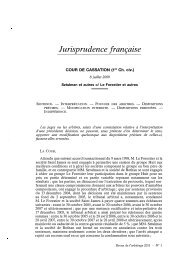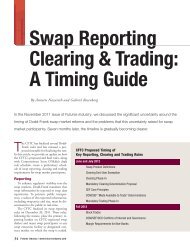What is a Broker-Dealer? - Davis Polk & Wardwell
What is a Broker-Dealer? - Davis Polk & Wardwell
What is a Broker-Dealer? - Davis Polk & Wardwell
Create successful ePaper yourself
Turn your PDF publications into a flip-book with our unique Google optimized e-Paper software.
§ 1A:4.2 BROKER-DEALER REGULATION<br />
based on the value thereof), or any put, call, straddle, option, or<br />
privilege entered into on a national securities exchange relating to<br />
foreign currency, or in general, any instrument commonly known<br />
as a “security”; or any certificate of interest or participation in,<br />
temporary or interim certificate for, receipt for, or warrant or right<br />
to subscribe to or purchase, any of the foregoing; but shall not<br />
include currency or any note, draft, bill of exchange, or banker’s<br />
acceptance which has a maturity at the time of <strong>is</strong>suance of not<br />
exceeding nine months, exclusive of days of grace, or any renewal<br />
thereof the maturity of which <strong>is</strong> likew<strong>is</strong>e limited. 240<br />
It was Congress’ intent to define “security” in general terms so as to<br />
include within the definition the many types of instruments that in<br />
the commercial world fall within the ordinary concept of a “security,”<br />
241 and courts have interpreted the definition of “security”<br />
broadly. 242 In determining whether an instrument <strong>is</strong> a security, courts<br />
will look at the economic reality and focus on the substance rather<br />
than form. 243<br />
The Dodd-Frank Act, signed into law on July 21, 2010, adds<br />
“security-based swaps” to the definition of “security” in section 3(a)(10)<br />
of the Exchange Act. “Security-based swaps” are d<strong>is</strong>cussed further in<br />
infra section 1A:4.4.<br />
§ 1A:4.2 Case Law on “Investment Contracts”<br />
[A] Generally<br />
The term “investment contract” <strong>is</strong> the residual category in the<br />
definition that captures securities that do not fall within other<br />
categories. Although not defined in the securities laws, it refers to an<br />
interest that <strong>is</strong> not a conventional security like “stock” or “bond,” but<br />
has the essential properties of a security and <strong>is</strong> treated as one for<br />
purposes of the securities laws. 244 It <strong>is</strong> a descriptive term capable of<br />
adaptation to meet many different types of investment schemes. 245<br />
There <strong>is</strong> a considerable body of case law on whether a given arrangement<br />
<strong>is</strong> an investment contract when it does not fall under the<br />
definition of other more commonly known securities. In the leading<br />
240. Exchange Act § 3(a)(10).<br />
241. H.R. REP. NO. 85, at 11 (1933).<br />
242. See Reves v. Ernst & Young, 494 U.S. 56 (1990); SEC v. Edwards, 540 U.S.<br />
389 (2004).<br />
243. See Tcherepnin v. Knight, 389 U.S. 332 (1967); SEC v. W.J. Howey Co.,<br />
328 U.S. 293 (1946); Reves, 494 U.S. 56.<br />
244. SEC v. Lauer, 52 F.3d 667 (7th Cir. 1995).<br />
245. See SEC v. W.J. Howey Co., 328 U.S. 293 (May 27, 1946), reh’g denied,<br />
329 U.S. 819 (Oct. 14, 1946); SEC v. Joiner Leasing Corp., 320 U.S. 344<br />
(Nov. 22, 1943).<br />
1A–56





